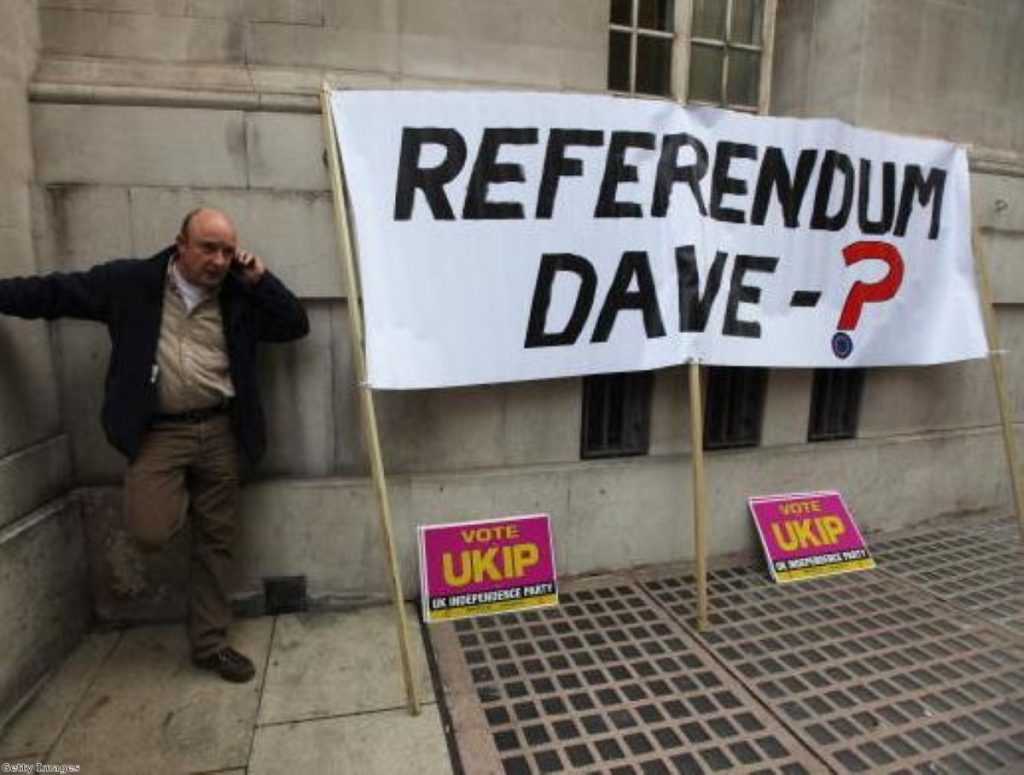EU referendum bill analysis: Ignoring the ‘gimmick’ might backfire
It all comes down to a lack of trust. When David Cameron made his big speech in January 2013, he was hoping to unite his party and put the issue to bed until at least after the next general election. It didn't quite work.
Eurosceptics didn't like the idea of the referendum as a campaigning tool. They feared it might get lost in the wash of any future coalition negotiations. And Cameron's inconsistent rhetoric – would it be guaranteed if he were prime minister, or if he had a Tory overall majority? – confused the backbenchers further.
So they concocted an idea so crazy it might just work. Government sources insist the idea of bypassing the Liberal Democrats, who vetoed any such bill in coalition time, hadn't even occurred to them until the spring. By using a private member's bill rubber-stamped by the Conservatives, the Tories have created the possibility of a major piece of constitutional legislation getting through the Commons without any of the usual scrutiny.
For, unbelievably, that is what is likely to happen. James Wharton's European Union (referendum) bill has not been consulted on. It has not had any pre-legislative scrutiny. It has not had a white paper. There have not been any of the usual impact assessments completed. Labour is looking on aghast.


The opposition faces a tough quandary. Do they ignore the bill, hoping it will die a slow and painful death in the Lords, or take some constitutional responsibility and try and give it the scrutiny it requires?
As it turns out, they're doing both. The Labour frontbench abstained on the bill's second reading. Then at committee stage, it raised a whole list of issues it wasn't comfortable with. Labour is worried by the phrasing of the proposed referendum question, and the franchise, and the timing, and a lot more besides. Doing so helps pave the way for a whole host of amendments tabled by Labour backbenchers which could come into play as the bill returns to the Commons floor for what could be a monstrous political battle.
While the Labour frontbench feigns disinterest, the vulnerability of all private members' bills now comes firmly into play. Unlike the government, individual MPs aren't able to pass guillotine motions which limit the amount of time each amendment gets debated for. 'No knives', in the language of parliamentary business managers.
This is awkward for James Wharton. It opens up the possibility of filibustering MPs doing their utmost to delay the bill. Enemies of the bill have until Wednesday to put forward amendments. Until then, every few hours eurosceptic Conservatives will be nervously checking the Table Office in parliament to see how many are put forward for debate.
Labour backbenchers who want to cause trouble for the Tories have only limited scope, however. Wharton's bill is deliberately short, so the opportunities for nit-picking are inherently limited. The Speaker tends to group amendments together, and once they have been debated there won't be any further opportunities to revisit them. When Friday comes, the Speaker will be having constant discussions with the Tories as to what amounts to a 'reasonable' time for debate for each group of amendments. That is subject to interpretation, which is why those conversations will be about the Conservatives putting pressure on the chair to move the debates on as quickly as possible.
Depending on how many amendments are put forward, the expectation is that Wharton's bill could take one, two or three Fridays to get through its Commons stages. Not bad going, given that is roughly half the total number of Fridays left for all private members' bills in this session. There are only a limited number of other bills which have made it this far, and they are unlikely to take up much time.
This is why Labour sources admit they are unlikely to be able to stop the bill getting to the Lords. They privately concede that a bill conceived as a vain bit of gesture politics is actually going to make it all the way through its Commons stages – something many observers simply didn't expect would happen.
It creates the intriguing prospect of yet another parliamentary battle, this time in the upper House, which will be much harder for the Tories to win.

